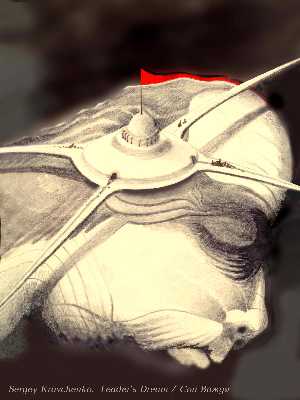
Alternate high-resolution image (180kb)
Artwork due to Sergey Kravchenko
Monday, 29 April – Sunday, 12 May 2002
The Symposium is supported by theUniversity of Pittsburgh,Carnegie Museum of Art, andFord Foundation, with assistance from the National Council for Eurasian and East European Research.

Alternate high-resolution image (180kb)
Artwork due to Sergey Kravchenko
Unlike much of Europe in the early twentieth century, Russia did not replace a dynastic-religious empire with a nation-state. Instead, it had substituted its dynastic empire with a socialist one, enduring three-quarters of a century.
In the years after the 1991 collapse of the USSR, the critical task facing Russia's leadership was not "merely" the appropriation of an existing structure. Instead, for the first time in Russia's thousand-year history, the task was to forge a nation-state from the remains of Europe's last multinational empire, the third largest empire in human history.
"Imperial Fatigue" presents a selection of recent films that trace, directly or indirectly, Russia's sloughing off of its imperial burden and reconstitution as a nation-state when the very function of the nation-state is called into question.
The film series will include other elements of contemporary Russian culture (graphic arts, performance poetry, prose), organized around two of Russia's most eminent conceptual artists: Dmitrii Prigov (Russia's leading conceptual poet and performance artist) and Vladimir Sorokin (Russia's most controversial postmodern writer). Exhibits of graphic work by Prigov will include readings from and performances of his literary work.
Four films, screened at Carnegie Museum of Art, will include Pavel Lungin'sTaxi Blues (1990) and Aleksei German's Khrustalev, My Car! (1998), both of which include acting by Prigov in pivotal scenes. Prigov will introduce Lungin's film, and will lead the discussion. Mikhail Iampol'skii will introduce Khrustalev, My Car! Mark Lipovetskii will present Aleksandr Zel'dovich's Moscow (2000). A fourth film, Vladimir Khotinenko's Muslim (1995), focuses on the fate of a Soviet soldier who, having served in Afghanistan, returns home converted to Islam.
| Mon April 29 | Tue April 30 | Wed May 1 | Thu May 2 | Fri May 3 | Sat May 4 |
| 11am-1pm. Roundtable chaired by Nancy Condee | |||||
| 5pm. Opening of Prigov art exhibit Phantom Installations at the University Art Gallery, Frick Fine Arts Building. Opening reception | |||||
| 7-9pm. Performance by Prigov Quiet Storm Coffeehouse, 5430 Penn Avenue | 7.30pm. CMA screening: Muslim. Introduced by Vladimir Padunov | 7.30pm. CMA screening: Khrustalev, My Car! Introduced by Mikhail Iampol'skii | 7.30pm. CMA screening: Moscow. Introduced by Mark Lipovetskii | 7.30pm. CMA screening: Taxi Blues. Introduced by Prigov. Q&A with Prigov following film |
Please note the repeat screenings at Carnegie Museum of Art.
| Thu May 9 | Fri May 10 | Sat May 11 | Sun May 12 |
| 7.30pm. CMA screening: Muslim | 7.30pm. CMA screening: Khrustalev, My Car! | 7.30pm. CMA screening: Moscow | 7.30pm. CMA screening: Taxi Blues |
Logistical information for attendees
Contact the Symposium Organizers